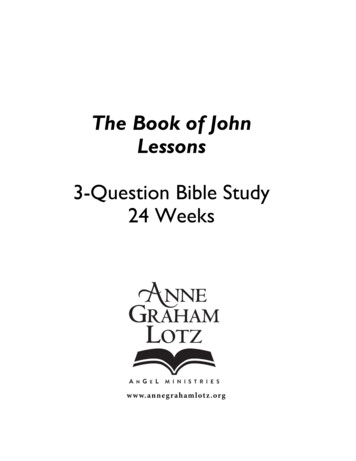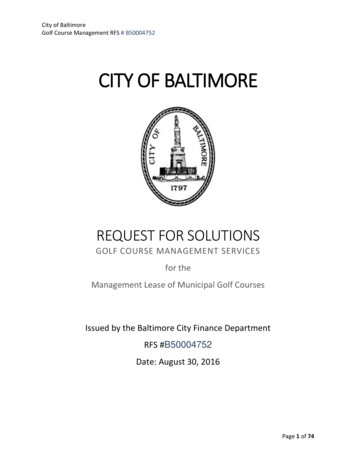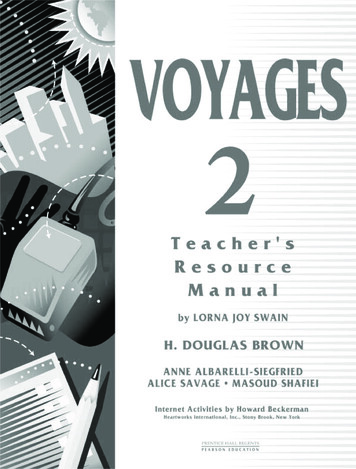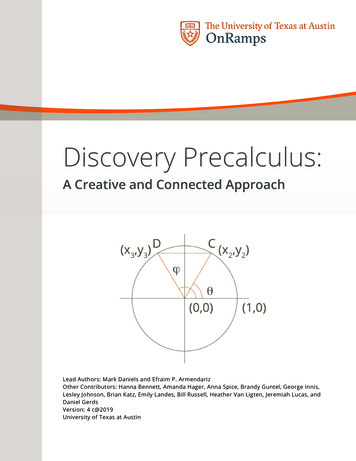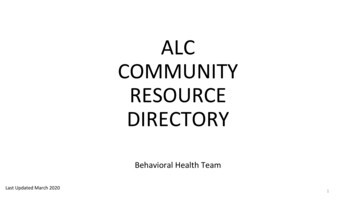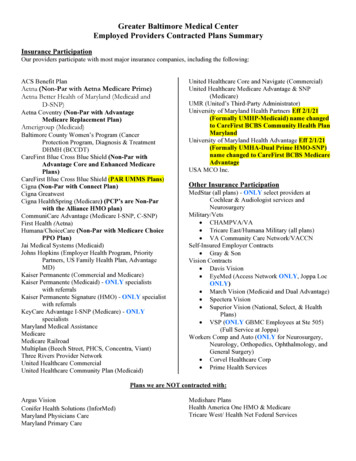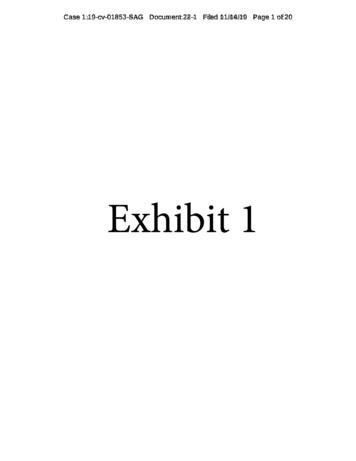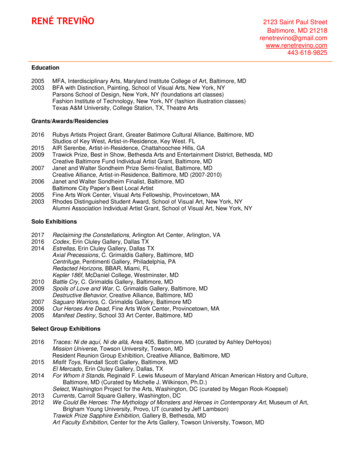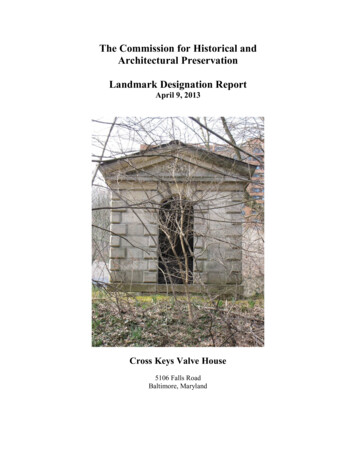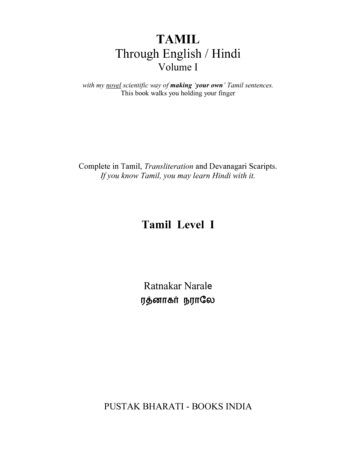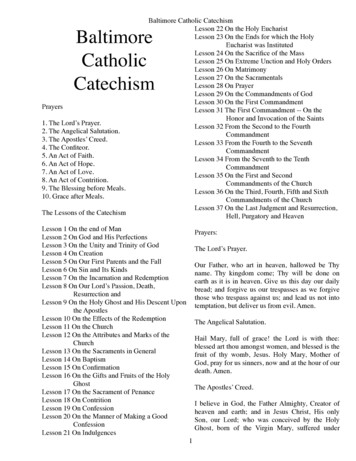
Transcription
Baltimore Catholic CatechismLesson 22 On the Holy EucharistLesson 23 On the Ends for which the HolyEucharist was InstitutedLesson 24 On the Sacrifice of the MassLesson 25 On Extreme Unction and Holy OrdersLesson 26 On MatrimonyLesson 27 On the SacramentalsLesson 28 On PrayerLesson 29 On the Commandments of GodLesson 30 On the First CommandmentLesson 31 The First Commandment -- On theHonor and Invocation of the SaintsLesson 32 From the Second to the FourthCommandmentLesson 33 From the Fourth to the SeventhCommandmentLesson 34 From the Seventh to the TenthCommandmentLesson 35 On the First and SecondCommandments of the ChurchLesson 36 On the Third, Fourth, Fifth and SixthCommandments of the ChurchLesson 37 On the Last Judgment and Resurrection,Hell, Purgatory and HeavenBaltimoreCatholicCatechismPrayers1. The Lord’s Prayer.2. The Angelical Salutation.3. The Apostles’ Creed.4. The Confiteor.5. An Act of Faith.6. An Act of Hope.7. An Act of Love.8. An Act of Contrition.9. The Blessing before Meals.10. Grace after Meals.The Lessons of the CatechismLesson 1 On the end of ManLesson 2 On God and His PerfectionsLesson 3 On the Unity and Trinity of GodLesson 4 On CreationLesson 5 On Our First Parents and the FallLesson 6 On Sin and Its KindsLesson 7 On the Incarnation and RedemptionLesson 8 On Our Lord’s Passion, Death,Resurrection andLesson 9 On the Holy Ghost and His Descent Uponthe ApostlesLesson 10 On the Effects of the RedemptionLesson 11 On the ChurchLesson 12 On the Attributes and Marks of theChurchLesson 13 On the Sacraments in GeneralLesson 14 On BaptismLesson 15 On ConfirmationLesson 16 On the Gifts and Fruits of the HolyGhostLesson 17 On the Sacrament of PenanceLesson 18 On ContritionLesson 19 On ConfessionLesson 20 On the Manner of Making a GoodConfessionLesson 21 On IndulgencesPrayers:The Lord’s Prayer.Our Father, who art in heaven, hallowed be Thyname. Thy kingdom come; Thy will be done onearth as it is in heaven. Give us this day our dailybread; and forgive us our trespasses as we forgivethose who trespass against us; and lead us not intotemptation, but deliver us from evil. Amen.The Angelical Salutation.Hail Mary, full of grace! the Lord is with thee:blessed art thou amongst women, and blessed is thefruit of thy womb, Jesus. Holy Mary, Mother ofGod, pray for us sinners, now and at the hour of ourdeath. Amen.The Apostles’ Creed.I believe in God, the Father Almighty, Creator ofheaven and earth; and in Jesus Christ, His onlySon, our Lord; who was conceived by the HolyGhost, born of the Virgin Mary, suffered under1
Baltimore Catholic CatechismPontius Pilate, was crucified; died, and was buried. An Act of Love.He descended into hell; the third day He aroseagain from the dead; He ascended into heaven, O my God! I love Thee above all things, with mysitteth at the right hand of God, the Father whole heart and soul, because Thou art all-goodAlmighty; from thence He shall come to judge the and worthy of all love. I love my neighbor asliving and the dead. I believe in the Holy Ghost the myself for the love of Thee. I forgive all who haveHoly Catholic Church, the communion of Saints, injured me, and ask pardon of all whom I havethe forgiveness of sins, the resurrection of the body, injured.and the life everlasting. Amen.An Act of Contrition.The Confiteor.O my God! I am heartily sorry for having offendedI confess to Almighty God, to blessed Mary, ever Thee, and I detest all my sins, because I dread theVirgin, to blessed Michael the Archangel, to loss of heaven and the pains of hell; but most of allblessed John the Baptist, to the holy Apostles Peter because they offend Thee, my God, who art alland Paul, and to all the Saints, that I have sinned good and deserving of all my love. I firmly resolve,exceedingly in thought, word and deed, through, with the help of Thy grace, to confess my sins, tomy fault, through my fault, through my most do penance, and to amend my life.grievous fault. Therefore, I beseech blessed Mary,ever Virgin, blessed Michael the Archangel, blessed The Blessing before Meals.John the Baptist, the holy Apostles Peter and Paul,and all the Saints, to pray to the Lord our God for † Bless us, O Lord! and these Thy gifts, which weme.are about to receive from Thy bounty, throughChrist our Lord. Amen.May the Almighty God have mercy on me, andforgive me my sins, and bring me to everlasting Grace after Meals.life. Amen.† We give Thee thanks for all Thy benefits, OMay the Almighty and merciful Lord grant me Almighty God, who livest and reignest for ever;pardon, absolution, and remission of all my sins. and may the souls of the faithful departed, throughAmen.the mercy of God, rest in peace. Amen.An Act of Faith.The Manner in which a Lay Person is to Baptize inCase of Necessity:Pour common water on the head or face of theperson to be baptized say while pouring it:“I baptize thee in the name of the Father, and of theSon, and of the Holy Ghost. ”O my God! I firmly believe that Thou art one Godin three Divine persons, Father, Son, and HolyGhost; I believe that Thy Divine Son became man,and died for our sins, and that he will come to,judge the living and the dead. I believe these andall the truths which the Holy Catholic Churchteaches, because Thou hast revealed them, whocanst neither deceive nor be deceivedN. B. Any person of either sex who has reached theuse of reason can baptize in case of necessity.LESSON FIRST: On the End of Man.An Act of Hope.Q. 126. What do we mean by the “end of man”?A. By the “end of man” we mean the purpose forwhich he was created: namely, to know, love, andserve God.O my God! relying on Thy infinite goodness andpromises, I hope to obtain pardon of my sins, thehelp of Thy grace, and life everlasting, through themerits of Jesus Christ, my Lord and Redeemer.2
Baltimore Catholic CatechismQ. 127. How do you know that man was created Q. 135. What is a creature?for God alone?A. A creature is anything created, whether it hasA. I know that man was created for God alone life or not; body or no body. Every being, person,because everything in the world was created for or thing except God Himself may be called asomething more perfect than itself: but there is creature.nothing in the world more perfect than man;therefore, he was created for something outside this Q. 136. Is this likeness in the body or in the soul?world, and since he was not created for the Angels, A. This likeness is chiefly in the soul.he must have been created for God.Q. 137. How is the soul like to God?Q. 128. In what respect are all men equal?A. The soul is like to God because it is a spirit thatA. All men are equal in whatever is necessary for will never die, and has understanding and free will.their nature and end. They are all composed of abody and soul; they are all created to the image and Q. 138. Is every invisible thing a spirit?likeness of God; they are all gifted with A. Every spirit is invisible -- which means can notunderstanding and free will; and they have all been be seen; but every invisible thing is not a spirit. Thecreated for the same end -- God.wind is invisible, and it is not a spirit.Q. 129. Do not men differ in many things?A. Men differ in many things, such as learning,wealth, power, etc. ; but these things belong to theworld and not man’s nature. He came into thisworld without them and he will leave it withoutthem. Only the consequences of good or evil donein this world will accompany men to the next.Q. 139. Has a spirit any other quality?A. A spirit is also indivisible; that is, it can not bedivided into parts, as we divide material things.Q. 140. What do the words “will never die” mean?A. By the words “will never die” we mean that thesoul, when once created, will never cease to exist,whatever be its condition in the next world. Hencewe say the soul is immortal or gifted withimmortality.Q. 130. Who made the world?A. God made the world.Q. 131. What does “world” mean in this question?A. In this question “world” means the universe;that is, the whole creation; all that we now see ormay hereafter see.Q. 141. Why then do we say a soul is dead while ina state of mortal sin?A. We say a soul is dead while in a state of mortalsin, because in that state it is as helpless as a deadbody, and can merit nothing for itself.Q. 132. Who is God?A. God is the Creator of heaven and earth, and ofall things.Q. 142. What does our “understanding” mean?A. Our “understanding” means the “gift of reason,”by which man is distinguished from all otheranimals, and by which he is enabled to think andthus acquire knowledge and regulate his actions.Q. 133. What is man?A. Man is a creature composed of body and soul,and made to the image and likeness of God.Q. 143. Can we learn all truths by our reasonalone?A. We can not learn all truths by our reason alone,for some truths are beyond the power of our reasonand must be taught to us by God.Q. 134. Does “man” in the Catechism mean allhuman beings?A. “Man” in the Catechism means all humanbeings, either men or women, boys, girls, orchildren.Q. 144. What do we call the truths God teaches us?3
Baltimore Catholic CatechismA. Taken together, we call the truths God teaches Q. 152. Of which must we take more care, our soulus revelation, and we call the manner by which He or our body?teaches them also revelation.A. We must take more care of our soul than of ourbody.Q. 145. What is “Free Will”?A. “Free Will” is that gift of God by which we are Q. 153. Why must we take more care of our soulenabled to choose between one thing and another; than of our body?and to do good or evil in spite of reward or A. We must take more care of our soul than of ourpunishment.body, because in losing our soul we lose God andeverlasting happiness.Q. 146. Have brute animals “understanding” and“free will”?Q. 154. What must we do to save our souls?A. Brute animals have not “understanding” and A. To save our souls, we must worship God by“free will. ” They have not “understanding” faith, hope, and charity; that is, we must believe inbecause they never change their habits or better Him, hope in Him, and love Him with all our heart.their condition. They have not “free will” becausethey never show it in their actions.Q. 155. What does “worship” mean?A. “Worship” means to give divine honor by actsQ. 147. What gift in animals supplies the place of such as the offering of prayer or sacrifice.reason?A. In animals the gift of “instinct” supplies the Q. 156. How shall we know the things which weplace of reason in guiding their actions.are to believe?A. We shall know the things which we are toQ. 148. What is instinct?believe from the Catholic Church, through whichA. “Instinct” is a gift by which all animals are God speaks to us.impelled to follow the laws and habits that God hasgiven to their nature.Q. 157. What do we mean by the “Church, throughwhich God speaks to us”?Q. 149. Have men as well as brutes “instinct”?A. By the “Church, through which God speaks toA. Men have “instinct,” and they show it when us,” we mean the “teaching Church”; that is, theplaced in sudden danger, when they have not time Pope, Bishops, and priests, whose duty it is toto use their reason. A falling man instantly grasps instruct us in the truths and practices of ourfor something to support him.religion.Q. 150. Why did God make you?A. God made me to know Him, to love Him, and toserve Him in this world, and to be happy with Himforever in the next.Q. 158. Where shall we find the chief truths whichthe Church teaches?A. We shall find the chief truths which the Churchteaches in the Apostles’ Creed.Q. 151. Why is it necessary to know God?A. It is necessary to know God because withoutknowing Him we cannot love Him; and withoutloving Him we cannot be saved. We should knowHim because He is infinitely true; love Himbecause He is infinitely beautiful; and serve Himbecause He is infinitely good.Q. 159. If we shall find only the “chief truths” inthe Apostles’ Creed, where shall we find theremaining truths?A. We shall find the remaining truths of our Faithin the religious writings and preachings that havebeen sanctioned by the authority of the Church.Q. 160. Name some sacred truths not mentioned inthe Apostles’ Creed.4
Baltimore Catholic CatechismA. In the Apostles’ Creed there is no mention of the A. God is everywhere whole and entire as He is inReal Presence of Our Lord in the Holy Eucharist, any one place. This is true and we must believe it,nor of the Infallibility of the Pope, nor of the though we cannot understand it.Immaculate Conception of the Blessed VirginMary, nor of some other truths that we are bound to Q. 168. If God is everywhere, why do we not seebelieve.Him?A. We do not see God, because He is a pure spiritQ. 161. Say the Apostles’ Creed.and cannot be seen with bodily eyes.A. I believe in God, the Father Almighty, Creatorof heaven and earth; and in Jesus Christ, His only Q. 169. Why do we call God a “pure spirit’?Son, our Lord; who was conceived by the Holy A. We call God a pure spirit because He has noGhost, born of the Virgin Mary, suffered under body. Our soul is a spirit, but not a “pure” spirit,Pontius Pilate, was crucified; died, and was buried. because it was created for union with our body.He descended into hell: the third day He aroseagain from the dead: He ascended into heaven, Q. 170. Why can we not see God with the eyes ofsitteth at the right hand of God, the Father our body?Almighty: from thence He shall come to judge the A. We cannot see God with the eyes of our bodyliving and the dead. I believe in the Holy Ghost, the because they are created to see only materialHoly Catholic Church, the communion of Saints, things, and God is not material but spiritual.the forgiveness of sins, the resurrection of the body,and the life everlasting. Amen.Q 171. Does God see us?A. God sees us and watches over us.LESSON SECOND: On God and His PerfectionsQ. 172. Is it necessary for God to watch over us?A. It is necessary for God to watch over us, forwithout His constant care we could not exist.Q. 162. What is a perfection?A. A perfection is any good quality a thing shouldhave. A thing is perfect when it has all the goodqualities it should have.Q. 173. Does God know all things?A. God knows all things, even our most secretthoughts, words, and actions.Q. 163. What is God?A. God is a spirit infinitely perfect.Q. 174. Can God do all things?A. God can do all things, and nothing is hard orimpossible to Him.Q. 164. What do we mean when we say God is“infinitely perfect”?A. When we say God is “infinitely perfect” wemean there is no limit or bounds to His perfection;for He possesses all good qualities in the highestpossible degree and He alone is “infinitely perfect.”Q. 175. When is a thing said to be “impossible”?A. A thing is said to be “impossible” when itcannot be done. Many things that are impossiblefor creatures are possible for God.Q. 165. Had God a beginning?A. God had no beginning; He always was and Healways will be.Q. 176. Is God just, holy, and merciful?A. God is all just, all holy, all merciful, as He isinfinitely perfect.Q. 166. Where is God?A. God is everywhere.Q. 177. Why must God be “just” as well as“merciful”?A. God must be just as well as merciful because Hemust fulfill His promise to punish those who meritQ. 167. How is God everywhere?5
Baltimore Catholic Catechismpunishment, and because He cannot be infinite inone perfection without being infinite in all.Q. 187. What do “divine” and “distinct” mean?A. “Divine” means pertaining to God, andQ. 178. Into what sins will the forgetfulness of “distinct” means separate; that is, not confoundedGod’s justice lead us?or mixed with any other thing.A. The forgetfulness of God’s justice will lead usinto sins of presumption.Q. 188. Is the Father God?A. The Father is God and the first Person of theQ 179. Into what sins will the forgetfulness of Blessed Trinity.God’s mercy lead us?A. The forgetfulness of God’s mercy will lead us Q. 189. Is the Son God?into sins of despair.A. The Son is God and the second Person of theBlessed Trinity.LESSON THIRD: On the Unity and Trinity of GodQ. 190. Is the Holy Ghost God?A. The Holy Ghost is God and the third Person ofthe Blessed Trinity.Q. 180. What does “unity,” and what does “trinity”mean?A. “Unity” means being one, and “trinity” meansthree-fold or three in one.Q. 191. Do “first,” “second,” and “third” withregard to the persons of the Blessed Trinity meanthat one person existed before the other or that oneis greater than the other?A. “First,” “second,” and “third” with regard to thepersons of the Blessed Trinity do not mean that oneperson was before the other or that one is greaterthan the other; for all the persons of the Trinity areeternal and equal in every respect. These numbersare used to mark the distinction between thepersons, and they show the order in which the oneproceeded from the other.Q. 181. Can we find an example to fully illustratethe mystery of the Blessed Trinity?A. We cannot find an example to fully illustrate themystery of the Blessed Trinity, because themysteries of our holy religion are beyondcomparison.Q. 182. Is there but one God?A. Yes; there is but one God.Q. 183. Why can there be but one God?A. There can be but one God because God, beingsupreme and infinite, cannot have an equal.Q. 192. What do you mean by the Blessed Trinity?A. By the Blessed Trinity I mean one God in threeDivine Persons.Q. 184. What does “supreme” mean?A. “Supreme” means the highest in authority; alsothe most excellent or greatest possible in anything.Thus in all things God is supreme, and in theChurch the Pope is supreme.Q. 193. Are the three Divine Persons equal in allthings?A. The three Divine Persons are equal in all things.Q. 194. Are the three Divine Persons one and thesame God?A. The three Divine Persons are one and the sameGod, having one and the same Divine nature andsubstance.Q. 185. When are two persons said to be equal?A. Two persons are said to be equal when one is inno way greater than or inferior to the other.Q. 186. How many persons are there in God?A. In God there are three Divine persons, reallydistinct, and equal in all things --the Father, theSon, and the Holy Ghost.Q. 195. What do we mean by the “nature” and“substance” of a thing?6
Baltimore Catholic CatechismA. By the “nature” of a thing we mean thecombination of all the qualities that make the thing Q. 203. By what form of prayer do we praise thewhat it is. By the “substance” of a thing we mean Holy Trinity?the part that never changes, and which cannot be A. We praise the Holy Trinity by a form of prayerchanged without destroying the nature of the thing. called the Doxology, which has come down to usalmost from the time of the Apostles.Q. 196. Can we fully understand how the threeDivine Persons are one and the same God?Q. 204. Say the Doxology.A. We cannot fully understand how the three A. The Doxology is: “Glory be to the Father, and toDivine Persons are one and the same God, because the Son, and to the Holy Ghost. As it was in thethis is a mystery.beginning, is now, and ever shall be, world withoutend. Amen. ”Q. 197. What is a mystery?A. A mystery is a truth which we cannot fully Q. 205. Is there any other form of the Doxology?understand.A. There is another form of the Doxology, which issaid in the celebration of the Mass. It is called theQ. 198. Is every truth which we cannot understand “Gloria in excelsis” or “Glory be to God on high,”a mystery?etc. , the words sung by the Angels at the birth ofA. Every truth which we cannot understand is not a Our Lord.mystery; but every revealed truth which no one canLESSON FOURTH: On Creationunderstand is a mystery.Q. 206. What is the difference between making andcreating?A. “Making” means bringing forth or forming outof some material already existing, as workmen do.“Creating” means bringing forth out of nothing, asGod alone can do.Q. 199. Should we believe truths which we cannotunderstand?A. We should and often do believe truths which wecannot understand when we have proof of theirexistence.Q. 200. Give an example of truths which allbelieve, though many do not understand them.A. All believe that the earth is round and moving,though many do not understand it. All believe thata seed planted in the ground will produce a floweror tree often with more than a thousand other seedsequal to itself, though many cannot understand howthis is done.Q. 207. Has everything that exists been created?A. Everything that exists except God Himself hasbeen created.Q. 208. Who created heaven and earth, and allthings?A. God created heaven and earth, and all things.Q. 201. Why must a divine religion havemysteries?A. A divine religion must have mysteries because itmust have supernatural truths and God Himselfmust teach them. A religion that has only naturaltruths, such as man can know by reason alone, fullyunderstand and teach, is only a human religion.Q. 209. From what do we learn that God createdheaven and earth and all things?A. We learn that God created heaven and earth andall things from the Bible or Holy Scripture, inwhich the account of the Creation is given.Q. 210. Why did God create all things?A. God created all things for His own glory and fortheir or our good.Q. 202. Why does God require us to believemysteries?A. God requires us to believe mysteries that wemay submit our understanding to Him.7
Baltimore Catholic CatechismQ. 211. Did God leave all things to themselves A. The angels were also created to assist before theafter He had created them?throne of God and to minister unto Him; they haveA. God did not leave all things to themselves after often been sent as messengers from God to man;He had created them; He continues to preserve and and are also appointed our guardians.govern them.Q. 220. Are all the Angels equal in dignity?Q. 212. What do we call the care by which God A. All the Angels are not equal in dignity. There arepreserves and governs the world and all it contains? nine choirs or classes mentioned in the HolyA. We call the care by which God preserves and Scripture. The highest are called Seraphim and thegoverns the world and all it contains His lowest simply Angels. The Archangels are oneclass higher than ordinary Angels.providence.Q. 221. Mention some Archangels and tell whatthey did.A. The Archangel Michael drove Satan out ofheaven; the Archangel Gabriel announced to theBlessed Virgin that she was to become the Motherof God. The Archangel Raphael guided andprotected Tobias.Q. 213. How did God create heaven and earth?A. God created heaven and earth from nothing byHis word only; that is, by a single act of His allpowerful will.Q. 214. Which are the chief creatures of God?A. The chief creatures of God are angels and men.Q. 222. Were Angels ever sent to punish men?A. Angels were sometimes sent to punish men. AnAngel killed 185,000 men in the army of a wickedking who had blasphemed God; an Angel also slewthe first-born in the families of the Egyptians whohad persecuted God’s people.Q. 215. How may God’s creatures on earth bedivided?A. God’s creatures on earth may be divided intofour classes: 1. Things that exist, as air; 2. Thingsthat exist, grow and live, as plants and trees; 3.Things that exist, grow, live and feel, as animals; 4.Things that exist, grow, live, feel and understand,as man.Q. 223. What do our guardian Angels do for us?A. Our guardian Angels pray for us, protect andguide us, and offer our prayers, good works anddesires to God.Q. 216. What are angels?A. Angels are pure spirits without a body, createdto adore and enjoy God in heaven.Q. 224. How do we know that Angels offer ourprayers and good works to God?A. We know that Angels offer our prayers and goodworks to God because it is so stated in HolyScripture, and Holy Scripture is the Word of God.Q. 217. If Angels have no bodies, how could theyappear?A. Angels could appear by taking bodies to renderthemselves visible for a time; just as the HolyGhost took the form of a dove and the devil tookthe form of a serpent.Q. 225. Why did God appoint guardian Angels ifHe watches over us Himself?A. God appointed guardian Angels to secure for ustheir help and prayers, and also to show His greatlove for us in giving us these special servants andfaithful friends.Q. 218. Name some persons to whom Angelsappeared.A. Angels appeared to the Blessed Virgin and St.Joseph; also to Abraham, Lot, Jacob, Tobias andothers.Q. 226. Were the angels, as God created them,good and happy?A. The angels, as God created them, were good andhappy.Q. 219. Were the angels created for any otherpurpose?8
Baltimore Catholic Catechismdescendants of Adam and Eve, because the wholeQ. 227. Did all the angels remain good and happy? human race had but one origin.A. All the angels did not remain good and happy;many of them sinned and were cast into hell, and Q. 235. Do not the differences in color, figure, etc. ,which we find in distinct races indicate a differencethese are called devils or bad angels.in first parents?Q. 228. Do we know the number of good and bad A. The differences in color, figure, etc. , which wefind in distinct races do not indicate a difference inAngels?A. We do not know the number of the good or bad first parents, for these differences have beenbrought about in the lapse of time by other causes,Angels, but we know it is very great.such as climate, habits, etc.Q. 229. What was the devil’s name before he fell,Q. 236. Were Adam and Eve innocent and holyand why was he cast out of heaven?A. Before he fell, Satan, or the devil, was called when they came from the hand of God?Lucifer, or light-bearer, a name which indicates A. Adam and Eve were innocent and holy whengreat beauty. He was cast out of heaven because they came from the hand of God.through pride he rebelled against God.Q. 237. What do we mean by saying Adam andEve “were innocent” when they came from theQ. 230. How do the bad Angels act toward us?A. The bad Angels try by every means to lead us hand of God?into sin. The efforts they make are called A. When we say Adam and Eve “were innocent”when they came from the hand of God we meantemptations of the devil.they were in the state of original justice; that is,they were gifted with every virtue and free fromQ. 231. Why does the devil tempt us?A. The devil tempts us because he hates goodness, every sin.and does not wish us to enjoy the happiness whichQ. 238. How was Adam’s body formed?he himself has lost.A. God formed Adam’s body out of the clay of theQ. 232. Can we by our own power overcome the earth and then breathed into it a living soul.temptations of the devil?A. We cannot by our own power overcome the Q. 239. How was Eve’s body formed?temptations of the devil, because the devil is wiser A. Eve’s body was formed from a rib taken fromthan we are; for, being an Angel, he is more Adam’s side during a deep sleep which God causedintelligent, and he did not lose his intelligence by to come upon him.falling into sin any more than we do now.Therefore, to overcome his temptations we need Q. 240. Why did God make Eve from one ofAdam’s ribs?the help of God.A. God made Eve from one of Adam’s ribs to showLESSON FIFTH: On our First Parents and the Fallthe close relationship existing between husbandand wife in their marriage union which God thenQ. 233. Who were the first man and woman?instituted.A. The first man and woman were Adam and Eve.Q. 241. Could man’s body be developed from theQ. 234. Are there any persons in the world who are body of an inferior animal?A. Man’s body could be developed from the bodynot the descendants of Adam and Eve?A. There are no persons in the world now, and of an inferior animal if God so willed; but sciencethere never have been any, who are not the does not prove that man’s body was thus formed,while revelation teaches that it was formed directlyby God from the clay of the earth.9
Baltimore Catholic Catechismstate of happiness in this life and everlasting gloryQ. 242. Could man’s soul and intelligence be in the next.formed by the development of animal life andQ. 249. Did Adam and Eve remain faithful to God?instinct?A. Man’s soul could not be formed by the A. Adam and Eve did not remain faithful to God,development of animal instinct; for, being entirely but broke His command by eating the forbiddenspiritual, it must be created by God, and it is united fruit.to the body as soon as the body is prepared toreceive it.Q. 250. Who was the first to disobey God?A. Eve was the first to disobey God, and sheQ. 243. Did God give any command to Adam and induced Adam to do likewise.Eve?A. To try their obedience, God commanded Adam Q. 251. How was Eve tempted to sin?and Eve not to eat of a certain fruit which grew in A. Eve was tempted to sin by the devil, who camethe garden of Paradise.in the form of a serpent and persuaded her to breakGod’s command.Q. 244. What was the Garden of Paradise?A. The Garden of Paradise was a large and Q. 252. Which were the chief causes that led Evebeautiful place prepared for man’s habitation upon into sin?earth. It was supplied with every species of plant A. The chief causes that led Eve into sin were:and animal and with everything that could 1. She went into the danger of sinning by admiringcontribute to man’s happiness.what was forbidden, instead of avoiding it. 2. Shedid not fly from the temptation at once, but debatedQ. 245. Where was the Garden of Paradise about yielding to it.situated?A. The exact place in which the Garden of Paradise Similar conduct on our part will lead us also into-- called also the Garden of Eden -- was situated is sin.not known, for the deluge may have so changed thesurface of the earth that old landmarks were wiped Q. 253. What befell Adam and Eve on account ofout. It was probably some place in Asia, not far their sin?from the river Euphrates.A. Adam and Eve, on account of their sin, lostinnocence and holiness, and were doomed toQ. 246. What was the tree bearing the forbidden sickness and death.fruit called?A. The tree bearing the forbidden fruit was called
I believe in the Holy Ghost the Holy Catholic Church, the communion of Saints, the forgiveness of sins, the resurrection of the body, and the life everlasting. Amen. The Confiteor. I confess to Almighty God, to blessed Mary, ever Virgin, to blessed Michael the Archangel, to blessed John the Baptist, to the holy Apostles Peter

